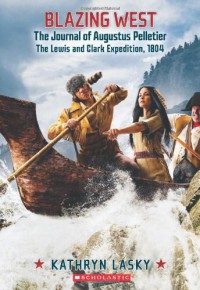

Fourteen-year-old Augustus, half French, half Omaha Indian, sets out to proof himself worthy of Lewis and Clark on their great adventure of discovery. He follows the explorers for two hundred miles before making his presence known to the commanding captain of the Corps of Discovery, Meriwether Lewis, himself. Gus's ability to read and write makes him useful to the explorers, and he starts to keep a record of their travels. But traveling west isn't easy, and the company faces constant danger. Is Augustus a tough enough explorer to survive such hardships?
Amazon.com
I'm revisiting Kathryn Lasky's writing (I previously read and really enjoyed her YA novel Beyond The Burning Time, regarding the Salem Witch Trials) with this epistolary novel that helps bring the Lewis & Clark Expedition to life for middle grade readers. Blazing West tells the history through the eyes of fictional figure Augustus Peltellier, a fourteen year old half French / half Native American boy. Augustus's biological father, a French trapper, is killed, leaving Augustus to be raised solely by his mother. But it doesn't take too long for his mother to remarry. Not long after her new marriage, she falls ill and dies (from pneumonia, I believe it was). Augustus is then left with his stepfather, a horrid, brutally abusive man. To escape the now violent house, Augustus hides out in the woods outside the camp of Meriwether Lewis & William Clark and their Corps of Discovery Expedition team, knowing that if he walks in outright he will be turned away for being too young.
So Augustus lives out in the woods, just out of sight, for some time until he finds the perfect time to casually introduce himself to Lewis. I cracked up at the image of Lewis not at all being ruffled by the sight of a teenage boy randomly walking out of the woods, Lewis just handing something to him, saying "hold this." X-D Proving himself useful, Augustus quickly becomes the general assistant / "go-for" boy to both Lewis and Clark. He also hunts for the crew and sketches wildlife for the expedition journals. A few months into the journey, Augustus also meets and becomes good friends with Sacajawea, just a year older than Gus but already married off with a baby on the way.
Gus's story, told entirely through his journal entries (beginning in May 1804, ending November 1805), give middle grade readers an idea of what such a journey might have been like through the eyes of someone close to their age. Gus survives a number of hardships out in the wilderness -- the camp running out of supplies, harsh winters, potentially hostile tribes, etc. --- but in the end gets to experience one of the great historical adventures, allowing readers to experience it as well. I liked Gus's voice, his good sense of country-flavored humor. I also liked that Lasky's way of weaving the actual history into this format will help the history come to life for students of the period, taking it out of the stale textbooks and making it feel like a real-life time period again.
While there's a great benefit to the diary-style format for young readers, as far as absorbing the facts along with the storyline, I will say that adult readers may not find the story itself entirely riveting. It is good, but not breath-takingly so, IMO. Still, a good starting point when looking for teaching materials on the subject. Another note on sharing this book with young readers -- the storyline does address factual information regarding people being lashed as a form of punishment. While not violently graphic in description, the mention of it is in the text. Just a heads up for parents and teachers. Also within the author's historical notes at the end Lasky does mention that Lewis committed suicide four years after coming back from this expedition. Again, just a heads up. {Sidenote on this: I read up on this a little bit and discovered that the suicide ruling is actually debated by some historians. Turns out there's some sketchy business to the accounts given by those who last interacted with Lewis, sketchiness that leads some historians to speculate that it possibly could have actually been murder. Who knows.}

 1
1








